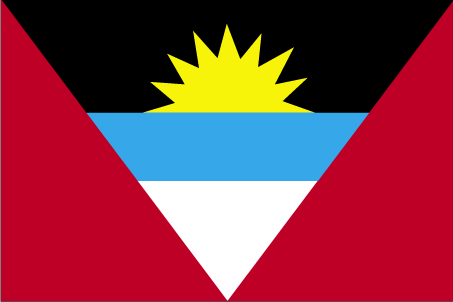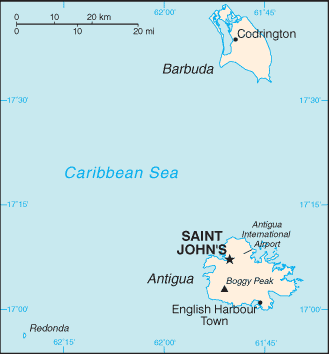|
Antigua and Barbuda
|

|
Capital: Saint John's
Population: 97,118
Brief History of Antigua and Barbuda:
The first inhabitants of Antigua were the Siboney, who were also called the stone people. Next came the Arawaks, Native Americans from Venezuela. Over time the Arawaks migrated northward through the islands. They brought new crops with them including pineapples, corn, tobacco, and cotton.
In 1493, Christopher Columbus arrived on the islands. He named the largest island Santa Maria de la Antigua. Several years later, in 1632, the English showed up to colonize the islands. They built large sugar plantations and brought in slaves to work the land.
Slavery was abolished in 1834, but labor conditions were still poor for the local workers for many years. In 1981, Antigua and Barbuda, became an independent state within the British Commonwealth of Nations.
The Geography of Antigua and Barbuda
Total Size: 443 square km
Size Comparison: 2.5 times the size of Washington, DC
Geographical Coordinates: 17 03 N, 61 48 W
World Region or Continent: Central America
General Terrain: mostly low-lying limestone and coral islands, with some higher volcanic areas
Geographical Low Point: Caribbean Sea 0 m
Geographical High Point: Vinson Massif 4,897 m
Climate: tropical maritime; little seasonal temperature variation
Major cities: SAINT JOHN'S (capital) 27,000 (2009), All Saints
The People of Antigua and Barbuda
Type of Government: constitutional parliamentary democracy
Languages Spoken: English (official), local dialects
Independence: 1 November 1981 (from UK)
National Holiday: Independence Day (National Day), 1 November (1981)
Nationality: Antiguan(s), Barbudan(s)
Religions: Christian (predominantly Anglican with other Protestant, and some Roman Catholic)
National Symbol:
National Anthem or Song: Fair Antigua, We Salute Thee
Economy of Antigua and Barbuda
Major Industries: tourism, construction, light manufacturing (clothing, alcohol, household appliances)
Agricultural Products: cotton, fruits, vegetables, bananas, coconuts, cucumbers, mangoes, sugarcane; livestock
Natural Resources: NEGL; pleasant climate fosters tourism
Major Exports: petroleum products 48%, manufactures 23%, machinery and transport equipment 17%, food and live animals 4%, other 8%
Major Imports: food and live animals, machinery and transport equipment, manufactures, chemicals, oil
Currency: East Caribbean dollar (XCD)
National GDP: $1,495,000,000
** Source for population (2012 est.) and GDP (2011 est.) is CIA World Factbook.
Back to Geography Home Page
